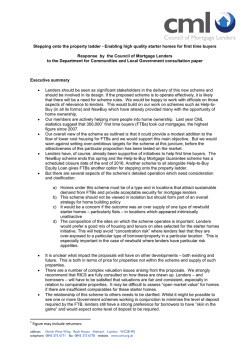
order - CFPB Monitor
Case: 1:14-cv-02783 Document #: 31 Filed: 12/09/14 Page 1 of 18 PageID #:461 UNITED STATES DISTRICT COURT NORTHERN DISTRICT OF ILLINOIS EASTERN DIVISION PEOPLE OF THE STATE OF ILLINOIS, ) by LISA MADIGAN, ILLINOIS ATTORNEY ) GENERAL, ) ) Plaintiff, ) ) v. ) ) CMK INVESTMENTS, INC. d/b/a ALL ) CREDIT LENDERS, an Illinois Corporation, 1 ) ) Defendant. ) No. 14 C 2783 Judge Sara L. Ellis OPINION AND ORDER This is a case brought for and on behalf of the People of the State of Illinois by Lisa Madigan, the Illinois Attorney General (“Plaintiff”) to remedy alleged violations of the Illinois Consumer Fraud and Deceptive Business Practices Act (“ICFA”), 815 Ill. Comp. Stat. 505/1 et seq., and the Dodd-Frank Wall Street Reform and Consumer Protection Act (the “Dodd-Frank Act”), 12 U.S.C. § 5301 et seq., by Defendant CMK Investments, Inc., d/b/a All Credit Lenders (“All Credit Lenders”). Plaintiff alleges that All Credit Lenders offers an unfair revolving line of credit product and engages in unfair, abusive, and deceptive practices in connection with that product. Before the Court is All Credit Lenders’ motion to dismiss. Because the Court finds that the claims are not barred by res judicata or by the disclosures that accompanied the loan agreement, the motion to dismiss [13] is denied. 1 The Defendant has been incorrectly identified as “CMK Investments, Inc. d/b/a All Credit Lenders, Inc.” The Court reforms the caption to exclude the “Inc.” from the d/b/a name. Case: 1:14-cv-02783 Document #: 31 Filed: 12/09/14 Page 2 of 18 PageID #:462 BACKGROUND 2 I. Consumer Finance Regulations Both federal and state law provide protections for consumers obtaining credit from an entity like All Credit Lenders. The Truth in Lending Act (“TILA”) and its implementing regulation, Regulation Z, provide that certain disclosures must be made for all open-end credit products. Open-end credit is defined as consumer credit extended by a creditor under a plan in which: (i) The creditor reasonably contemplates repeated transactions; (ii) The creditor may impose a finance charge from time to time on an outstanding unpaid balance; and (iii) The amount of credit that may be extended to the consumer during the term of the plan (up to any limit set by the creditor) is generally made available to the extent that any outstanding balance is repaid. 12 C.F.R. § 226.2(a)(20). Additionally, the Dodd-Frank Act makes it unlawful for a creditor to provide a consumer with a financial product that violates federal consumer financial law and to engage in any unfair, deceptive, or abusive act or practice. 12 U.S.C. § 5536(a). Abusive acts or practices are those that (1) materially interfere[ ] with the ability of a consumer to understand a term or condition of a consumer financial product or service; or (2) take[ ] unreasonable advantage of– 2 The facts in the background section are taken from Plaintiff’s complaint and exhibits attached thereto and are presumed true for the purpose of resolving All Credit Lenders’ motion to dismiss. See Virnich v. Vorwald, 664 F.3d 206, 212 (7th Cir. 2011); Local 15, Int’l Bhd. of Elec. Workers, AFL-CIO v. Exelon Corp., 495 F.3d 779, 782 (7th Cir. 2007). A court normally cannot consider extrinsic evidence without converting a motion to dismiss into one for summary judgment. Hecker v. Deere & Co., 556 F.3d 575, 582–83 (7th Cir. 2009). Where a document is referenced in the complaint and central to plaintiff’s claims, however, the Court may consider it in ruling on the motion to dismiss. Id. The Court may also take judicial notice of matters of public record. Gen. Elec. Capital Corp. v. Lease Resolution Corp., 128 F.3d 1074, 1080–81 (7th Cir. 1997). 2 Case: 1:14-cv-02783 Document #: 31 Filed: 12/09/14 Page 3 of 18 PageID #:463 (A) a lack of understanding on the part of the consumer of the material risks, costs, or conditions of the product or service; (B) the inability of the consumer to protect the interests of the consumer in selecting or using a consumer financial product or service; or (C) the reasonable reliance by the consumer on a covered person to act in the interests of the consumer. 12 U.S.C. § 5531(d). The Consumer Financial Protection Bureau (“CFPB”) is one of the agencies charged with enforcing the Dodd-Frank Act. Illinois has several statutes regulating consumer loans. In 2005, Illinois enacted the Payday Loan Reform Act. A “payday loan” is a loan where the finance charge exceeds an annual percentage rate of 36% and the term does not exceed 120 days. 815 Ill. Comp. Stat. 122/1-10. The Consumer Installment Loan Act (“CILA”), 205 Ill. Comp. Stat. 670/1 et seq., was amended in 2010 to regulate “small consumer loans,” which are loans “upon which interest is charged at an annual percentage rate exceeding 36% and with an amount financed of $4,000 or less.” 205 Ill. Comp. Stat. 670/15(b). Lenders licensed under CILA cannot also obtain a license under the Payday Loan Reform Act; they must choose whether they want to provide loans under one statute or the other. But a lender licensed under CILA may also make certain open-ended loans pursuant to the Illinois Financial Services Development Act (“FSDA”), 205 Ill. Comp. Stat. 675/1 et seq. Unlike other lenders under the FSDA, CILA licensees are capped at charging 36% interest on any open-end credit products offered under the FSDA. 205 Ill. Comp. Stat. 675/3(a). II. All Credit Lenders’ Revolving Credit Plan Since 1999, All Credit Lenders has offered short-term consumer loan products. Prior to 2011, All Credit Lenders was licensed under CILA. In January 2011, before the 2010 changes to 3 Case: 1:14-cv-02783 Document #: 31 Filed: 12/09/14 Page 4 of 18 PageID #:464 CILA and the FSDA went into effect, All Credit Lenders applied for a license under the Payday Loan Reform Act, which it received in April 2011. Shortly thereafter, All Credit Lenders returned that license to the Illinois Department of Financial Institutions, opting instead to maintain its CILA license. In March 2011, All Credit Lenders introduced a new open-end credit product, the Revolving Credit Plan. The Revolving Credit Plan is typically for an amount between $100 and $2,000. Consumers are given two forms: an agreement and disclosure form, as well as a billing cycle schedule. The disclosed interest rate varies between 18% and 24%. The consumer is also required to pay an account protection fee. The account protection fee provides that the consumer will not be charged the account protection fee or interest for a period of up to twelve months if the consumer becomes unemployed or loses his or her government benefits. Certain restrictions apply, including that the account must be current before the benefit takes effect. In those agreements where the disclosed annual percentage rate is 18%, the account protection fee is at least $10 for every $50 of the consumer’s outstanding balance, payable every billing cycle (i.e. every two weeks). For example, a consumer with an outstanding balance of $800 would pay All Credit Lenders an account protection fee of $160 every two weeks in addition to any daily interest that has accrued at the 18% rate. In those agreements where the disclosed annual percentage rate is 24%, the account protection fee is either $11 or $15 for every $50 of the consumer’s outstanding balance. The agreement provides that the minimum payment for each billing cycle is “the total interest charged for the billing cycle plus the Account Protection Fee and paper billing fee if any.” Ex. 1 to Compl. at 2. In bold letters, the agreements further states, “PLEASE NOTE: if you only pay your minimum payment, you will not pay down your principal balance.” Id. 4 Case: 1:14-cv-02783 Document #: 31 Filed: 12/09/14 Page 5 of 18 PageID #:465 Suggestions are made as to how to pay down the principal balance, which include making payments before due dates and in amounts greater than the minimum payment. In connection with signing the agreement, consumers receive a billing cycle schedule that provides payment dates typically corresponding with employment pay dates for one year. Consumers are directed to make a payment at All Credit Lenders’ stores on each payment due date. When a consumer asks what the payment amount is, the consumer is quoted the minimum payment amount, which includes only interest and the account protection fee. All Credit Lenders’ agents do not inform consumers that the amount covers only interest and fees and not principal, leading consumers to believe that they are paying down principal in addition to interest. Moreover, the billing cycle schedule suggests to consumers that if payment is made on each listed date, the loan will be paid off. But if only the minimum payment is made on each listed payment date, consumers never pay off their loans. III. Consumer Illustrations Plaintiff has provided several examples of consumers who have obtained credit through All Credit Lenders’ Revolving Credit Plan. In November 2012, Cheryl Wooden-Wolf met with an All Credit Lenders agent about obtaining a loan to help pay her bills. She entered a Revolving Credit Plan agreement with All Credit Lenders for $450 on November 21, 2012, believing that she was taking out a loan in which the entire proceeds would be fully repaid through a fully amortizing payment schedule by a specified end date. When she asked for the total pay-off amount, the agent told Wooden-Wolf that she would have to pay $101 every two weeks. In connection with this representation, Wooden-Wolf received a schedule of billing cycle dates that began in December 2012, with November 22, 2013 as the last listed date. The loan agreement specified an annual percentage rate of 24% interest, but she was also charged an 5 Case: 1:14-cv-02783 Document #: 31 Filed: 12/09/14 Page 6 of 18 PageID #:466 account protection fee of $11 for every $50 borrowed. All Credit Lenders’ agent did not explain the nature or amount of the account protection fee to Wooden-Wolf when she signed the agreement. The first few times a payment was due, Wooden-Wolf paid the amount she was told to pay, believing she was paying both principal and interest. After making approximately four payments, she realized her principal balance had not decreased. Thus, in February 2013, she paid $553.50 to pay off the remaining balance of her loan, having made payments totaling approximately $900 over a three month period on a $450 loan. If she had paid only the disclosed 24% interest rate on her loan over that time, she would have paid $27 in interest. As another example, Loralty Harden entered a Revolving Credit Plan agreement with All Credit Lenders in November 2011 for $100 at a stated interest rate of 18%. The agreement included an account protection fee of $15 on every $50 borrowed. In March or April 2012, Harden paid the outstanding balance and received an additional $100 from All Credit Lenders. In July 2012, she learned that her outstanding balance on this additional $100 was not decreasing despite the fact that she had made payments as directed by All Credit Lenders’ agents. Upon inquiry, the agent explained the account protection fee and its purpose to protect her in case she became unemployed. As Harden was retired and received monthly disability and social security benefits, she explained to the agent that the account protection fee did not apply to her. After Harden filed a complaint with the Illinois Attorney General’s Office, All Credit Lenders agreed to stop collection on the agreement if she paid $50. She did this in January 2013. IV. Prior Investigations into All Credit Lenders’ Practices In July 2012, the Illinois Department of Financial and Professional Regulation (the “IDFPR”), which is charged with regulating lenders licensed under CILA, served All Credit Lenders with two Notices of Intent to Fine. These Notices alleged certain CILA violations, 6 Case: 1:14-cv-02783 Document #: 31 Filed: 12/09/14 Page 7 of 18 PageID #:467 including improper interest calculations, with respect to All Credit Lenders’ Revolving Credit Plan product. An administrative hearing was scheduled on the Notices for October 2012. In October and November 2012, All Credit Lenders also received Notices of Exceptions from the IDFPR, which listed additional alleged violations of CILA, including that the annual percentage rate was not accurately disclosed, that All Credit Lenders was engaged in subterfuge to avoid CILA, that the stated periodic interest rate was incorrect, and that All Credit Lenders imposed fees or charges on the consumer that were not authorized by CILA. All Credit Lenders responded, arguing that the loans at issue were not governed by CILA but rather by the FSDA and that all charges were correct and appropriately disclosed in accordance with TILA. Moreover, All Credit Lenders argued that the IDFPR did not have authority to regulate loans made pursuant to the FSDA. Nevertheless, the IDFPR pursued the allegations by issuing All Credit Lenders five Notices of Intent to Fine in December 2012 and January 2013. Administrative hearings were scheduled on these five Notices for May 2013. In February 2013, the parties entered into a settlement of the first two Notices and the matters were “removed from the call pursuant to a settlement agreement.” Ex. 1 to Pl.’s Resp. The remaining five Notices were withdrawn in April 2013. 3 LEGAL STANDARD A motion to dismiss under Rule 12(b)(6) challenges the sufficiency of the complaint, not its merits. Fed. R. Civ. P. 12(b)(6); Gibson v. City of Chicago, 910 F.2d 1510, 1520 (7th Cir. 1990). In considering a Rule 12(b)(6) motion to dismiss, the Court accepts as true all wellpleaded facts in the plaintiff’s complaint and draws all reasonable inferences from those facts in the plaintiff’s favor. AnchorBank, FSB v. Hofer, 649 F.3d 610, 614 (7th Cir. 2011). To survive 3 No settlement agreement or order removing these five Notices from the administrative call has been submitted to the Court. 7 Case: 1:14-cv-02783 Document #: 31 Filed: 12/09/14 Page 8 of 18 PageID #:468 a Rule 12(b)(6) motion, the complaint must not only provide the defendant with fair notice of a claim’s basis but must also be facially plausible. Ashcroft v. Iqbal, 556 U.S. 662, 678, 129 S. Ct. 1937, 173 L. Ed. 2d 868 (2009); see also Bell Atl. Corp. v. Twombly, 550 U.S. 544, 555, 127 S. Ct. 1955, 167 L. Ed. 2d 929 (2007). “A claim has facial plausibility when the plaintiff pleads factual content that allows the court to draw the reasonable inference that the defendant is liable for the misconduct alleged.” Iqbal, 556 U.S. at 678. ANALYSIS I. Res Judicata All Credit Lenders first argues that Plaintiff’s claims should be dismissed because they are barred by res judicata. Res judicata is an affirmative defense but may be considered under Rule 12(b)(6) where the plaintiff has through the allegations in her complaint pleaded herself out of court. Muhammad v. Oliver, 547 F.3d 874, 878 (7th Cir. 2008). The Court applies Illinois law on res judicata because All Credit Lenders seeks to give preclusive effect to proceedings that occurred in an Illinois administrative agency. See Chicago Title Land Trust Co. v. Potash Corp. of Sask. Sales Ltd., 664 F.3d 1075, 1079 (7th Cir. 2011). Res judicata applies here if (1) the identity of the parties or their privies is the same in this suit as in the administrative proceedings, (2) the claims in this and the administrative proceedings are the same, and (3) there were final judgments on the merits in the administrative proceedings. Id. All Credit Lenders bears the burden of proving that res judicata applies. Rooding v. Peters, 92 F.3d 578, 580 (7th Cir. 1996). All Credit Lenders’ argument fails on the third requirement and thus the Court need not consider the other two. Although IDFPR investigated All Credit Lenders in 2012 and 2013 and agreed to resolve certain citations on issues similar to those raised here, those resolutions were 8 Case: 1:14-cv-02783 Document #: 31 Filed: 12/09/14 Page 9 of 18 PageID #:469 not final judgments on the merits for res judicata purposes. “[R]es judicata cannot operate in the absence of a judgment.” Carver v. Nall, 172 F.3d 513, 515 (7th Cir. 1999). Although All Credit Lenders argues that the administrative actions involving the seven Notices of Intent to Fine were all dismissed with prejudice, the Court has been presented with an order indicating that two of the Notices set for hearing before an administrative law judge were “removed from the call pursuant to a settlement agreement,” Ex. 1 to Pl.’s Resp., and that the remaining five Notices were to be “withdrawn” by IDFPR, Ex. J to Def.’s Mem. These documents show only that the administrative proceedings were settled, that the notices were withdrawn, and that no judgment or finding was ever made by the IDFPR or the administrative law judge. 4 See Carver, 172 F.3d at 515 (finding that there was no administrative determination or judgment where the union settled an administrative case before the Illinois State Labor Relations Board, after which the charges brought before it were withdrawn); Bernhardt v. Fritzshall, 293 N.E.2d 650, 655, 9 Ill. App. 3d 1041 (1973) (“A withdrawal means only that the petition is withdrawn from the court’s consideration, and certainly connotes nothing more than a voluntary dismissal which is not a bar to further proceedings. A dismissal with prejudice denotes an adjudication on the merits and is Res judicata.”). Although there was a settlement agreement, at least with respect to two of the Notices, “[a] settlement agreement that has not been integrated into a consent decree is not a judgment and cannot trigger res judicata.” Carver, 172 F.3d at 515; cf. 4901 Corp. v. Town of Cicero, 220 F.3d 522, 529 (7th Cir. 2000) (“[U]nder Illinois law a settlement agreement that a state court adopts and incorporates, like the agreement here, is the equivalent of a consent decree. As such, it operates to the same extent for res judicata purposes as a judgment entered after contest and is conclusive with respect to the matters which were settled by the judgment or 4 All Credit Lenders argues in reply that removal from the call is “IDFPR speak for dismissal.” Def.’s Reply at 9. But All Credit Lenders provides no support for this assertion. 9 Case: 1:14-cv-02783 Document #: 31 Filed: 12/09/14 Page 10 of 18 PageID #:470 decree.” (citations omitted) (internal quotation marks omitted)). Because there is no administrative determination to which preclusion may apply, Plaintiff’s claims are not barred by IDFPR’s previous investigation of All Credit Lenders. See Carver, 172 F.3d at 515 (“No preclusion doctrines, statutory of common law, operate in the absence of an underlying judgment or administrative finding. Illinois, like every other jurisdiction of which we are aware, requires at a minimum an administrative determination before it will apply preclusion doctrines.”). Thus, the Court will proceed to examine the sufficiency of Plaintiff’s allegations. II. Sufficiency of Plaintiff’s Allegations Plaintiff seeks relief on behalf of Illinois citizens under both ICFA and the Dodd-Frank Act, arguing that All Credit Lenders has engaged in unfair and deceptive business practices in offering the Revolving Credit Plan. Plaintiff alleges that All Credit Lenders misrepresents the true cost and nature of the Revolving Credit Plan, suggesting that the amount a consumer obtains from All Credit Lenders under the Revolving Credit Plan can be paid off in a year by making payments in the amounts told to them by All Credit Lenders agents and on the dates on the schedule given to them. This, however, is not possible, as the minimum payment amount consists only of accrued interest and the account protection fee, and thus repayment is a neverending cycle. Plaintiff also complains that All Credit Lenders is charging interest above the allowed 36% maximum by couching interest as an account protection fee, which is of no actual benefit to some consumers and is of no benefit to other consumers in relationship to its cost. All Credit Lenders argues that Plaintiff’s claims must be dismissed because the Revolving Credit Plan agreement discloses that the minimum payment covers only interest and the account protection fee and does not affect the principal. All Credit Lenders also contends that its practices with respect to the account protection fee are not unfair or deceptive because 10 Case: 1:14-cv-02783 Document #: 31 Filed: 12/09/14 Page 11 of 18 PageID #:471 they comply with TILA’s disclosure requirements and nothing more is required. The Court will address these arguments separately. A. Minimum Payment First, All Credit Lenders argues that its disclosures in the Revolving Credit Plan agreements regarding the minimum payment bar any claims based on misrepresentations regarding the effect of making payments as directed by All Credit Lenders’ agents and whether making the minimum payment in accordance with the provided repayment schedule would allow the loan to be paid off by the last date listed on that schedule. The Revolving Credit Plan agreement states that the “total minimum payment will be the total interest charged for the billing cycle plus the Account Protection Fee and paper billing fee if any.” Ex. 1 to Compl. at 2. The agreement continues, in bold letters, “PLEASE NOTE: if you only pay your minimum payment, you will not pay down your principal balance.” Id. The following acknowledgment is included above the signature block: By signing this Agreement, Borrower acknowledges that he/she has/have read, understand(s), that this Agreement was completed prior to signing and that Borrower has received an executed copy of the Agreement in English and in the language in which the Agreement was negotiated. Borrower has received a completed copy of this agreement and has all disclosure information. This Agreement constitutes the entire Agreement between the parties and no representations, warranties, promises whether oral or implied have been made by either party. Ex. 1 to Compl. at 7. All Credit Lenders argues that these disclosures undermine any misrepresentation claim regarding minimum payments and the time it would take to pay off the initial amount a consumer borrowed. Illinois law provides that parties to a contract are “charged with knowledge of and assent to a signed agreement.” Johnson v. Orkin, LLC, 928 F. Supp. 2d 989, 1007 (N.D. Ill. 2013). The fact that a consumer may not have read the Revolving Credit Plan agreement, which disclosed 11 Case: 1:14-cv-02783 Document #: 31 Filed: 12/09/14 Page 12 of 18 PageID #:472 that the minimum payment covers only interest and the account protection fee, does not negate the fact that this information was disclosed to the consumer; such knowledge is charged to the consumer as a result of the consumer’s signature on the agreement. Breckenridge v. Cambridge Homes, Inc., 616 N.E.2d 615, 620, 246 Ill. App. 3d 810, 186 Ill. Dec. 425 (1993) (“A party who has had an opportunity to read a contract before signing, but signs before reading, cannot later plead lack of understanding.”). A claim of “fraud is, in most situations, unavailable to avoid the effect of the written agreement where the complaining party could have discovered the fraud by reading the instrument, and was in fact afforded a full opportunity to do so.” Belleville Nat’l Bank v. Rose, 456 N.E.2d 281, 284, 119 Ill. App. 3d 56, 74 Ill. Dec. 779 (1983). The Belleville court suggested, however, that a great disparity in bargaining power and sophistication may constitute an exception to this general rule. Id. at 285; see also Am. Sav. Ass’n v. Conrath, 462 N.E.2d 849, 854, 123 Ill. App. 3d 140 (1984) (“Absent circumstances indicating a manifest inequality between the respective parties, one who is aware of the nature and character of the instrument one is signing cannot subsequently avoid the terms of the instrument by claiming that he or she was deceived by representations outside the instrument itself.”). Here, Plaintiff alleges that All Credit Lenders actively misled consumers with respect to the effect of the payments they were making. She claims the Revolving Credit Plan was aimed at vulnerable consumers, suggesting an inequality in position between the borrower and the lender. But more importantly for the purpose of this motion to dismiss, Plaintiff is not seeking to recover against All Credit Lenders under a common law fraud theory, which would require proof of reliance, but rather for abusive and deceptive practices under ICFA and the Dodd-Frank Act. ICFA does not require a showing of reliance. Davis v. G.N. Mortg. Corp., 396 F.3d 869, 883 (7th Cir. 2005). As a result, some courts have found that an ICFA claim for alleged 12 Case: 1:14-cv-02783 Document #: 31 Filed: 12/09/14 Page 13 of 18 PageID #:473 misrepresentations may proceed notwithstanding the fact that these misrepresentations were contradicted by the terms of a contract. See Cozzi Iron & Metal, Inc. v. U.S. Office Equip., Inc., 250 F.3d 570, 576–77 (7th Cir. 2001) (although common law fraud claim was barred because plaintiff could not show it relied on oral representations different from contract terms, ICFA claim could proceed past motion to dismiss based on the same facts because reliance is not a required element of an ICFA claim); Paterson v. Wells Fargo Bank, N.A., No. 11 C 7954, 2012 WL 4483525, at *5 (N.D. Ill. Sept. 27, 2012) (allowing ICFA claim to proceed despite fact that alleged misstatements conflicted with terms of contract); Duffy v. Ticketreserve, Inc., 722 F. Supp. 2d 977, 991 n.10 (N.D. Ill. 2010) (“[B]ecause reasonable reliance is not a pleading requirement to state a claim under the Illinois Consumer Fraud Act, the existence of contradictory contractual language does not necessarily undermine Plaintiffs’ facially adequate pleading.”). But see RBS Citizens, N.A. v. Sanyou Import, Inc., No. 11 C 1820, 2011 WL 2712744, at *2 (N.D. Ill. July 13, 2011) (dismissing ICFA claim “based on misrepresentations that conflict with the terms revealed within the very loan documents signed”); Bank of Am., N.A. v. Shelbourne Dev. Grp., Inc., 732 F. Supp. 2d 809, 826 (N.D. Ill. 2010) (“Shelbourne cannot state an ICFA claim based on terms that are revealed within the very loan documents that it signed.”). Following Cozzi, that All Credit Lenders’ agreements disclosed the effect of making minimum payments does not bar Plaintiff’s claim that All Credit Lenders violated ICFA by actively misrepresenting the effect of the payments they were telling consumers to make. Similarly, guidance from the CFPB on what constitutes a deceptive practice suggests that Plaintiff’s Dodd-Frank Act claim may proceed, as the CFPB Supervision and Examination Manual provides that “[w]ritten disclosures may be insufficient to correct a misleading statement or representation, particularly where the consumer is directed away from qualifying limitations 13 Case: 1:14-cv-02783 Document #: 31 Filed: 12/09/14 Page 14 of 18 PageID #:474 in the text or is counseled that reading the disclosures is unnecessary.” CFPB Supervision and Examination Manual, at UDAAP 5 (ver. 2 Oct. 2012), http://files.consumerfinance.gov/f/ 201210_cfpb_supervision-and-examination-manual-v2.pdf. Thus, the Court will allow Plaintiff to proceed with these claims. B. Account Protection Fee All Credit Lenders also argues that Plaintiff’s claims regarding the account protection fee should be dismissed because All Credit Lenders has complied with TILA’s disclosure requirements. According to All Credit Lenders, TILA compliance forecloses any relief Plaintiff might obtain under ICFA or the Dodd-Frank Act. More specifically, All Credit Lenders maintains that TILA and Regulation Z require it to disclose interest and charges for debt suspension coverage separately, meaning that the account protection fee cannot be defined as interest under the FSDA, as Plaintiff contends. According to All Credit Lenders, the account protection fee qualifies as “debt suspension coverage,” for it “provides for suspension of the obligation to make one or more payments on the date(s) otherwise required by the credit agreement, when a specified event occurs.” CFPB Official Interpretation to 12 C.F.R. § 1026.4(b)(10). Interest and required debt suspension coverage are identified as separate components of the finance charge under TILA. 12 C.F.R. § 1026.4(b)(1), (10). Plaintiff does not contend that All Credit Lenders violated TILA’s disclosure requirements. Consequently, All Credit Lenders maintains that its compliance with TILA is a defense to Plaintiff’s ICFA and Dodd-Frank Act claims. It is well-established under Illinois law that “compliance with the disclosure requirements in the federal Truth in Lending Act is a defense under [ICFA].” Hoffman v. Grossinger Motor Corp., 218 F.3d 680, 684 (7th Cir. 2000); Lanier v. Assocs. Fin., Inc., 499 N.E.2d 440, 447, 114 Ill. 2d 1, 101 Ill. Dec. 852 (1986) 14 Case: 1:14-cv-02783 Document #: 31 Filed: 12/09/14 Page 15 of 18 PageID #:475 (“[U]nder section 10b(1) of the Consumer Fraud Act, the defendant’s compliance with the disclosure requirements of the Truth in Lending Act is a defense to liability under the Illinois Consumer Fraud Act in the present case.”). All Credit Lenders also contends that only disclosures that violate TILA are actionable under the Dodd-Frank Act’s provision outlawing unfair, deceptive, or abusive acts or practices. Compliance with TILA’s disclosure requirements does not absolve All Credit Lenders from liability under ICFA or the Dodd-Frank Act if its account protection fee is otherwise unfair, deceptive, or abusive, however. See, e.g., Jenkins v. Mercantile Mortg. Co., 231 F. Supp. 2d 737, 752 (N.D. Ill. 2002) (“The Illinois Supreme Court in Lanier held only that, where TILA was implicated and the defendant was in compliance, Illinois law does not impose greater disclosure requirements than those mandated by federal law. The Lanier court did not hold . . . that merely because a party does not violate a federal law, it does not violate ICFA.”); CFPB Supervision and Enforcement Manual, at UDAAP 10 (“[A] transaction that is in technical compliance with other federal or state laws may nevertheless violate the prohibition against [unfair, deceptive, or abusive acts and practices]. For example, an advertisement may comply with TILA’s requirements, but contain additional statements that are untrue or misleading, and compliance with TILA’s disclosure requirements does not insulate the rest of the advertisement from the possibility of being deceptive.”). Plaintiff contends that the account protection fee is unfair, deceptive, and abusive because it should be considered interest under the FSDA and thus the Revolving Credit Plan charges interest above the FSDA’s 36% limit on interest and because the account protection fee is not beneficial to consumers. These allegations do not rest on the sufficiency of All Credit Lenders’ disclosures, and thus All Credit Lenders’ compliance with TILA is not necessarily a bar to moving forward with them. 15 Case: 1:14-cv-02783 Document #: 31 Filed: 12/09/14 Page 16 of 18 PageID #:476 Nonetheless, All Credit Lenders maintains that TILA’s distinction between interest and debt suspension coverage controls and that the account protection fee cannot be classified as interest for purposes of calculating whether the Revolving Credit Plan violates the FSDA’s cap on interest. Plaintiff, on the other hand, argues that the FSDA requires the account protection fee to be included as interest in calculating whether the interest rate exceeds the 36% cap. Section 6 of the FSDA can be read to define interest broadly: In addition to or in lieu of interest at a periodic rate or rates as provided in Section 5, and without limitation of the foregoing Section 4, a financial institution may, if the agreement governing the revolving credit plan so provides, charge and collect as interest, in such manner or form as the plan may provide, an annual or other periodic fee for the privileges made available to the borrower under the plan, a transaction charge or charges, late fees or delinquency charges, returned payment charges, over limit charges and fees for services rendered. 205 Ill. Comp. Stat. 675/6. According to this section, the account protection fee, which Plaintiffs argue is a “periodic fee for the privileges made available to the borrower under the plan,” could be treated as interest and thus included to calculate the interest rate for purposes of the FSDA’s interest cap. When the account protection fee is added to the 18% or 24% interest charged, the Revolving Credit Plan exceeds the FSDA’s 36% interest cap. All Credit Lenders does not provide support for its argument that the way in which federal law defines how an interest rate is calculated controls for purposes of state law. Although the Court has not found Illinois law on point, a Louisiana court held that each state may define what constitutes interest for purposes of determining compliance with its own laws, suggesting that Illinois is not bound by TILA’s distinction between interest and debt suspension coverage. See Gulfco Fin. Co. v. Garrett, 631 So. 2d 602, 603 (La. Ct. App. 1994) (determining whether interest rate charged on loan was usurious under Louisiana law by looking to definition of finance charge and annual percentage rate under Louisiana, not federal, law). The Court does 16 Case: 1:14-cv-02783 Document #: 31 Filed: 12/09/14 Page 17 of 18 PageID #:477 not find this to be inconsistent with TILA’s disclosure requirements so as to trigger TILA preemption, see 12 C.F.R. § 1026.28(a)(1), for TILA does not address the maximum interest rate that can be charged for open-ended credit like that here and only covers disclosures, which Plaintiff is not challenging. See Heastie v. Cmty. Bank of Greater Peoria, 690 F. Supp. 716, 721 (N.D. Ill. 1988) (TILA does not preempt ICFA claim where, among other things, compliance with both TILA and ICFA “is not a physical impossibility”). Thus, at this stage, the Court finds that Plaintiff’s ICFA claim adequately alleges a violation of state law. 5 Cf. Equitable Life Assurance Soc’y of the U.S. v. Scali, 232 N.E.2d 712, 716, 38 Ill. 2d 544 (1967) (“We are of the opinion that the requirement that a borrower acquire and assign life insurance to the lender up to the amount of his loan as additional security for the loan does not render the interest usurious, absent a showing from an examination of the entire transaction that the insurance requirement was a mere device to collect usurious interest.”). Finally, All Credit Lenders makes only a conclusory argument that Plaintiff’s claim that the account protection fee is of no benefit to the consumer should be dismissed. All Credit Lenders contends that Plaintiff ignores the benefit that the account protection fee provides to borrowers, which is that a consumer need not make any payments for up to twelve months if the 5 Because the parties essentially treat their ICFA and Dodd-Frank claims interchangeably in the briefing on the motion to dismiss, the Court is somewhat unclear as to whether Plaintiff is alleging that All Credit Lenders committed an abusive practice under the Dodd-Frank Act by charging an account protection fee that should be considered interest. Plaintiff’s complaint alleges that All Credit Lenders violated the Dodd-Frank Act by taking advantage of consumers’ lack of understanding that they “are charged a Required Account Protection Fee on their loan” and of “[t]he true nature of the Required Account Protection Fee.” Compl. ¶ 182(a)–(b). This suggests to the Court that Plaintiff’s allegations regarding the account protection fee under the Dodd-Frank Act do not include those under ICFA related to violation of the FSDA, as Plaintiff has specifically alleged that the account protection fee is undisclosed interest that violates the FSDA as part of her ICFA claim, see id. ¶¶ 178(c), 179(a). Nor can Plaintiff challenge the account protection fee under the Dodd-Frank Act for being usurious, for the CFPB has no authority to “establish a usury limit applicable to an extension of credit.” 12 U.S.C. § 5517(o). But because All Credit Lenders has not developed an independent argument as to why the allegations regarding the account protection fee under the Dodd-Frank Act should be dismissed, the Court will at this stage allow them to proceed to the extent they do not challenge the account protection fee as being undisclosed interest or usurious. 17 Case: 1:14-cv-02783 Document #: 31 Filed: 12/09/14 Page 18 of 18 PageID #:478 consumer is unemployed or stops receiving benefits. Plaintiff, however, has alleged that the benefit provided to the consumer is minimal or non-existent, particularly where a consumer is retired and thus could not take advantage of the alleged benefit. The Court deems this to be a factual issue not appropriate for resolution on a motion to dismiss. Thus, Plaintiff may proceed on its claims in discovery. CONCLUSION For the foregoing reasons, All Credit Lenders’ motion to dismiss [13] is denied. All Credit Lenders is ordered to answer the complaint by December 31, 2014. Dated: December 9, 2014 ______________________ SARA L. ELLIS United States District Judge 18
© Copyright 2026







